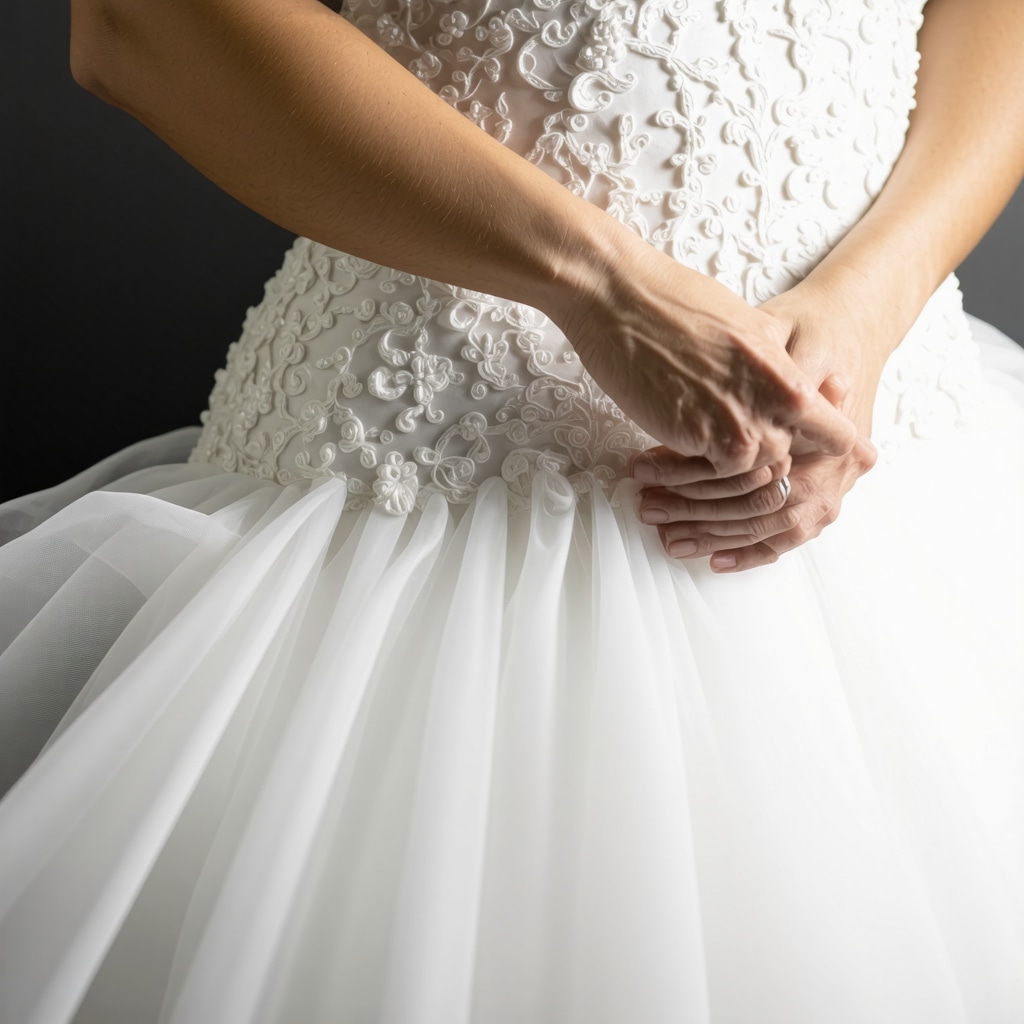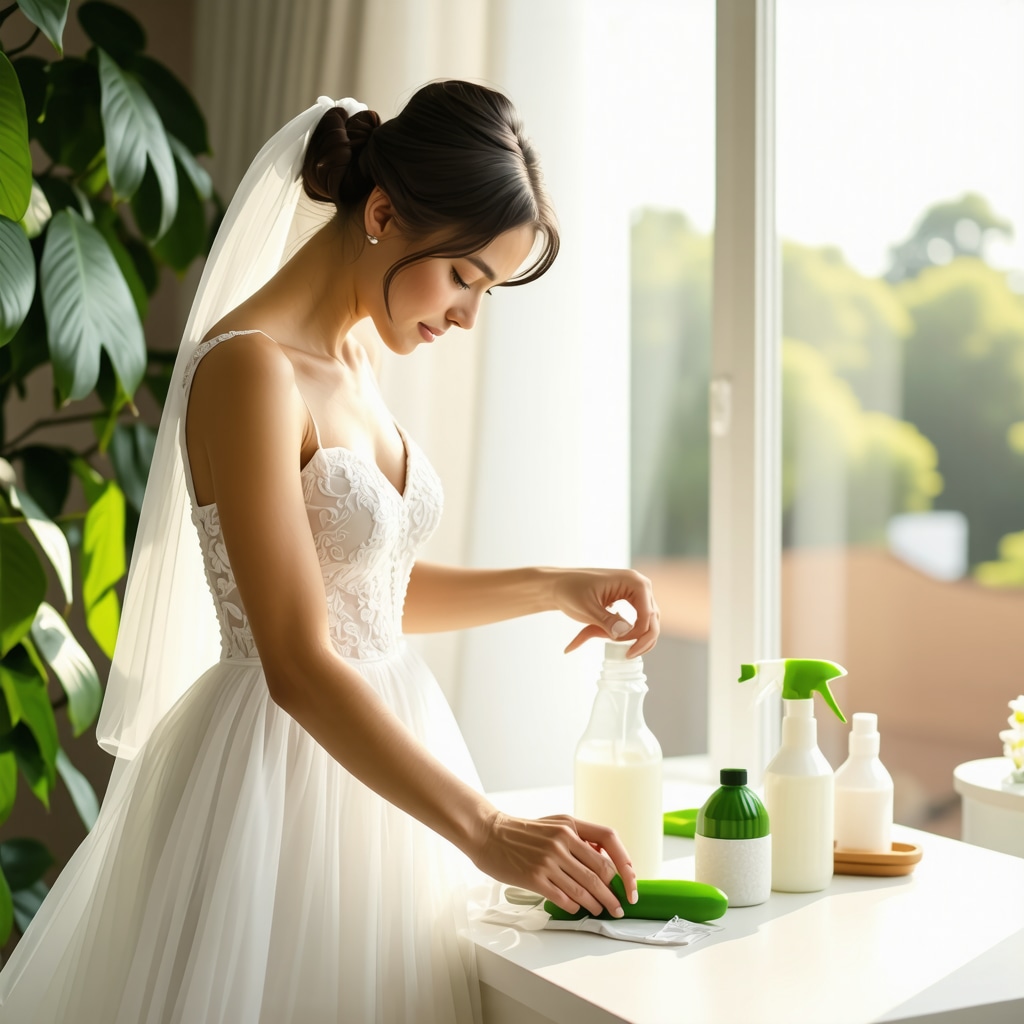My Journey to Sustainable Wedding Dress Care in Tampa
Planning my wedding in Tampa, I was determined to make every aspect eco-friendly, especially my wedding dress. I remember walking into a boutique and realizing how many chemicals and plastics are involved in traditional gown cleaning. That moment sparked my passion for learning about sustainable dress care strategies that not only protect my gown but also our planet.
Why Eco-Conscious Dress Preservation Matters
As I delved deeper, I discovered that caring for a wedding dress sustainably means choosing eco-friendly cleaning methods that reduce water use, avoid harmful chemicals, and embrace natural preservation techniques. Protecting delicate fabrics like silk and lace while minimizing environmental impact became my top priority.
The Best Eco-Friendly Wedding Dress Care Practices in Tampa
What Are My Top Strategies for Green Dress Maintenance?
First, I opted for professional eco-friendly cleaning services. Tampa has some fantastic options, like those found here, that use biodegradable detergents and energy-efficient equipment. I also learned that proper storage using breathable, climate-controlled containers helps extend the life of my gown without damaging the fabric.
In addition, I make it a point to handle my dress gently, avoiding harsh chemicals or abrasive cleaning. For stains, I prefer natural solutions like baking soda or vinegar, but only after consulting with professionals—since some stains require expert removal techniques, as explained here.
How Can I Ensure Long-Term Preservation?
To keep my gown pristine for years to come, I follow best practices like avoiding direct sunlight and keeping it in a dark, cool place. I also read about the importance of periodic inspections, which can prevent mold and fabric deterioration, especially in Tampa’s humid climate.
Why Is Professional Eco-Friendly Cleaning the Best Choice?
While DIY methods appeal, I found that professional cleaners specialized in sustainable practices are more effective and safer for delicate fabrics. They understand the nuances of eco-friendly products and can handle vintage or couture gowns with care. For a comprehensive guide on this, check here.
If you’re a Tampa bride like me, embracing eco-friendly strategies is a beautiful way to honor your commitment and the environment. Feel free to share your experiences or ask questions in the comments below—I love connecting with others on this journey!
Mastering Eco-Friendly Preservation Techniques for Wedding Gowns in Tampa
As Tampa’s wedding industry increasingly embraces sustainability, understanding expert methods for eco-friendly dress preservation becomes essential. Beyond choosing biodegradable detergents, professionals recommend using natural fabrics for storage containers, such as breathable cotton or linen, which allow the gown to breathe and prevent mold buildup. Additionally, climate-controlled storage units tailored for delicate fabrics help maintain optimal humidity and temperature levels, safeguarding your gown’s integrity over decades.
What Are the Innovative Approaches to Eco-Conscious Dress Preservation?
Cutting-edge techniques include using plant-based cleaning agents that are free from harmful chemicals, ensuring minimal environmental impact while maintaining fabric quality. Some Tampa-based specialists also incorporate natural preservation oils, like lanolin or beeswax, to reinforce delicate fibers without damaging them. Moreover, digital documentation of your gown’s condition—via high-resolution photography and detailed condition reports—reduces the need for frequent physical inspections, thereby limiting handling and potential wear.
For vintage or couture gowns, experts often recommend enzyme-based cleaning methods that break down organic stains naturally. These techniques are gentle yet effective, preserving the gown’s original beauty without the chemical residues associated with traditional cleaning. To explore these options further, consult this resource.
How Do Preservation Strategies Adapt to Tampa’s Climate Challenges?
Tampa’s humid subtropical climate presents specific challenges, such as mold growth and fabric deterioration. Experts advise the use of silica gel packets within storage containers to absorb excess moisture. Additionally, periodic climate checks—using portable hygrometers—allow for proactive adjustments, like increasing dehumidification or relocating the gown to a cooler, less humid environment.
Furthermore, professional preservation includes tailored cleaning schedules that account for Tampa’s weather patterns, ensuring long-term protection. Partnering with local specialists who understand these climate nuances—such as those offering long-term preservation services—is vital for maintaining gown beauty over time.
How Can Experts Assist in Balancing Preservation and Sustainability?
Experts bring a nuanced understanding of fabric science and eco-friendly products, enabling them to craft personalized preservation plans. They assess each gown’s unique fabric composition, stain history, and sentimental value, then recommend suitable natural cleaning and storage solutions. This tailored approach minimizes environmental impact while maximizing preservation results. For instance, they might suggest using recycled tissue paper pads instead of synthetic fillers or opting for eco-friendly preservatives that are safe for both the gown and the planet.
Engaging with professionals who prioritize sustainable practices, like those highlighted here, ensures you’re making environmentally responsible choices without compromising the gown’s longevity. Their expertise can also include advice on storing your gown in an environmentally conscious manner, such as using biodegradable garment bags or repurposing vintage trunks for display and storage.
Would you like to learn more about combining traditional preservation techniques with eco-friendly innovations? Sharing your experiences or questions in the comments helps build a community of Tampa brides committed to sustainable elegance. For additional insights on long-term wedding gown care, explore this comprehensive guide.
Deepening the Commitment: The Intricacies of Sustainable Wedding Dress Preservation in Tampa
As I immersed myself further into Tampa’s eco-conscious wedding industry, I found that mastering sustainable gown preservation involves more than just choosing biodegradable products. It’s a delicate dance of understanding fabric science, environmental impacts, and the emotional value woven into each gown. This journey required me to explore innovative techniques that marry tradition with modern eco-awareness, such as using natural preservation oils like lanolin to reinforce delicate fibers without introducing harmful chemicals.
One personal realization was that the humidity in Tampa’s climate necessitates proactive measures. I discovered that natural moisture-wicking fabrics like silk and lace are especially vulnerable to mold and fabric deterioration. To combat this, I began incorporating silica gel packets into storage containers, which absorb excess moisture without chemical emissions. Interestingly, I learned that some local specialists even employ plant-based cleaning agents that are free from synthetic residues, offering a gentler yet effective cleaning process, as discussed here.
How Do I Balance Preservation and Eco-Responsibility When Dealing with Vintage or Couture Gowns?
This question often haunted me because vintage gowns, with their fragile silk and intricate lace, demand meticulous care. I found that enzyme-based cleaning methods—using natural enzymes to break down organic stains—are a game-changer, providing a gentle yet effective solution that preserves the gown’s original beauty without harmful chemicals. Working with Tampa’s experts who understand these nuances has been invaluable, especially when they suggest using recycled tissue paper pads instead of synthetic fillers, which aligns with my eco-friendly ethos. Their advice on storing gowns in biodegradable garment bags or vintage trunks not only protects the fabric but also reduces plastic waste, supporting a sustainable future.
Sharing these experiences has connected me with many Tampa brides who are eager to explore greener alternatives. If you’re navigating similar waters, I encourage you to reach out or share your stories—your insights can inspire others in our community to embrace eco-conscious preservation techniques, as recommended here.
What Are the Hidden Benefits of Natural Preservation Methods in Tampa’s Climate?
Beyond the obvious environmental advantages, natural preservation methods offer tangible benefits for Tampa brides. They help maintain the gown’s integrity by avoiding the harsh effects of chemicals that can weaken delicate fabrics over time. I found that natural oils, like beeswax, can reinforce fibers and provide a subtle protective layer. Additionally, these methods often involve less handling, which reduces wear and tear. I also discovered that digital documentation—high-resolution images and detailed condition reports—minimize unnecessary physical inspections, further preserving the gown’s pristine condition. For a comprehensive overview of these techniques, check this resource.
Another insight I gained was the importance of periodic climate checks using portable hygrometers. This simple device helps monitor humidity levels, allowing me to adjust dehumidification efforts proactively. Such attention to detail is vital in Tampa’s humid subtropical climate, where mold spores thrive and can silently ruin years of cherished memories. Partnering with local specialists who understand these climate challenges ensures my gown remains protected for generations.
How Can I Incorporate Traditional Elegance with Sustainable Practice Without Compromising Quality?
This question resonates deeply because I cherish the timeless beauty of vintage and couture gowns. I found that combining traditional preservation techniques with eco-friendly innovations is not only possible but enriching. For instance, using natural preservation oils and organic cleaning agents does not diminish the gown’s allure; instead, it enhances my peace of mind knowing I am safeguarding both the fabric and our environment. Engaging Tampa’s experts who prioritize sustainable practices ensures that my gown’s elegance endures while respecting our planet’s health. Their advice on storage, such as repurposing vintage trunks with eco-conscious materials, adds a meaningful layer to my preservation journey.
Ultimately, the key lies in continuous learning and community sharing. I invite you to explore these sustainable strategies and share your own experiences. Together, we can redefine bridal elegance—embracing beauty that lasts and a future that’s greener. For further inspiration, visit this guide.
Elevating Sustainable Gown Preservation with Cutting-Edge Techniques in Tampa
My ongoing exploration into eco-conscious wedding dress care in Tampa has unveiled a realm of innovative preservation methods that marry environmental responsibility with meticulous fabric care. Beyond traditional practices, I’ve delved into sophisticated strategies that leverage natural compounds and scientific insights to prolong the life of delicate fabrics like silk, lace, and vintage textiles.
How Do Natural Preservation Oils Enhance Fabric Longevity Without Chemical Residues?
Natural oils such as lanolin and beeswax have gained prominence among Tampa’s eco-conscious specialists for their ability to reinforce fragile fibers while maintaining breathability. These oils form a protective layer that wards off moisture, mold, and environmental pollutants, which are particularly problematic in Tampa’s humid climate. Incorporating these oils requires precise application techniques—using minimal quantities and ensuring even coverage—to avoid altering the gown’s original texture or appearance. This approach aligns with the guidance from industry leaders who emphasize preserving fabric integrity naturally, as outlined here.

What Are the Scientific Foundations of Enzyme-Based Cleaning for Vintage and Couture Gowns?
Enzyme-based cleaning employs natural enzymes derived from microorganisms that specifically target organic stains like sweat, wine, or food residues—common challenges in vintage and couture gown preservation. These enzymes act gently yet effectively, breaking down organic matter without the aggressive chemicals found in conventional cleaning agents. This method not only minimizes environmental impact but also preserves the gown’s delicate fibers, color, and intricate lacework. Tampa’s specialists are increasingly adopting these bio-friendly techniques, which are supported by research from organizations such as the vintage gown experts.
How Can Digital Documentation Revolutionize Long-Term Preservation and Monitoring?
Digital documentation, including high-resolution photography and detailed condition reports, has emerged as an innovative approach to sustainable gown preservation. By creating comprehensive visual and descriptive records, Tampa’s preservationists can monitor the gown’s condition over decades without frequent physical handling, which reduces wear and tear. Cloud-based storage and comparison tools enable easy tracking of fabric changes, stains, or deterioration, facilitating timely interventions. This practice embodies a shift toward minimally invasive, data-driven preservation—an essential strategy for maintaining heirlooms in humid climates.
Engaging with these advanced techniques has transformed my understanding of sustainable preservation. If you’re passionate about maintaining the beauty of your gown while honoring eco-responsibility, I invite you to explore these expert insights further and share your experiences. Together, we can pioneer a new standard of elegance rooted in sustainability.
Things I Wish I Knew Earlier (or You Might Find Surprising)
Natural Oils Are Powerful Allies
Discovering that natural preservation oils like beeswax and lanolin can reinforce delicate fabrics was a game-changer for me. I used to think chemical treatments were the only way to protect my gown, but these eco-friendly oils provide a gentle, effective alternative that aligns with my values.
Humidity Is More Than Just a Climate Concern
Living in Tampa, I learned that humidity isn’t just uncomfortable; it’s a real threat to gown preservation. Using silica gel packets and climate-controlled storage became essential parts of my routine, helping me prevent mold and fabric deterioration over time.
DIY Isn’t Always Better
I once tried to clean a stain myself with vinegar, only to find it made things worse. It taught me that consulting professionals who specialize in eco-friendly cleaning ensures my gown gets the gentle, effective care it needs without risking damage.
Digital Documentation Is a Lifesaver
Taking high-resolution photos and keeping detailed condition reports has helped me monitor my gown’s health over the years, reducing unnecessary handling and preserving its beauty for decades.
Vintage Gowns Require Special Attention
Vintage gowns with fragile fabrics demand enzyme-based cleaning and eco-friendly storage solutions. Learning these tricks from Tampa’s specialists has helped me maintain the gown’s timeless elegance while respecting our planet.
Resources I’ve Come to Trust Over Time
- Encyclopedia of Textile Conservation: This comprehensive resource deepened my understanding of fabric science and preservation techniques, making me more confident in my choices.
- Green Wedding Shoes Blog: I love their eco-conscious wedding tips, especially their focus on sustainable gown care and preservation.
- American Institute for Conservation of Historic and Artistic Works (AIC): Their guidelines on natural preservation methods are trustworthy and backed by scientific research, which reassures me about my eco-friendly approach.
- Local Tampa Specialists’ Websites: Their insights into climate-specific preservation strategies have been invaluable, helping me adapt my practices to Tampa’s unique environment.
Parting Thoughts from My Perspective
Embracing sustainable wedding dress care in Tampa has been a rewarding journey that combines tradition with eco-conscious innovation. I’ve realized that natural oils, climate-aware storage, and professional guidance are key to preserving my gown’s beauty and honoring our planet. If you’re passionate about preserving your wedding memories responsibly, I encourage you to explore these techniques and find what works best for you. Share your experiences or ask questions in the comments—I love connecting with fellow brides committed to sustainability!
,

